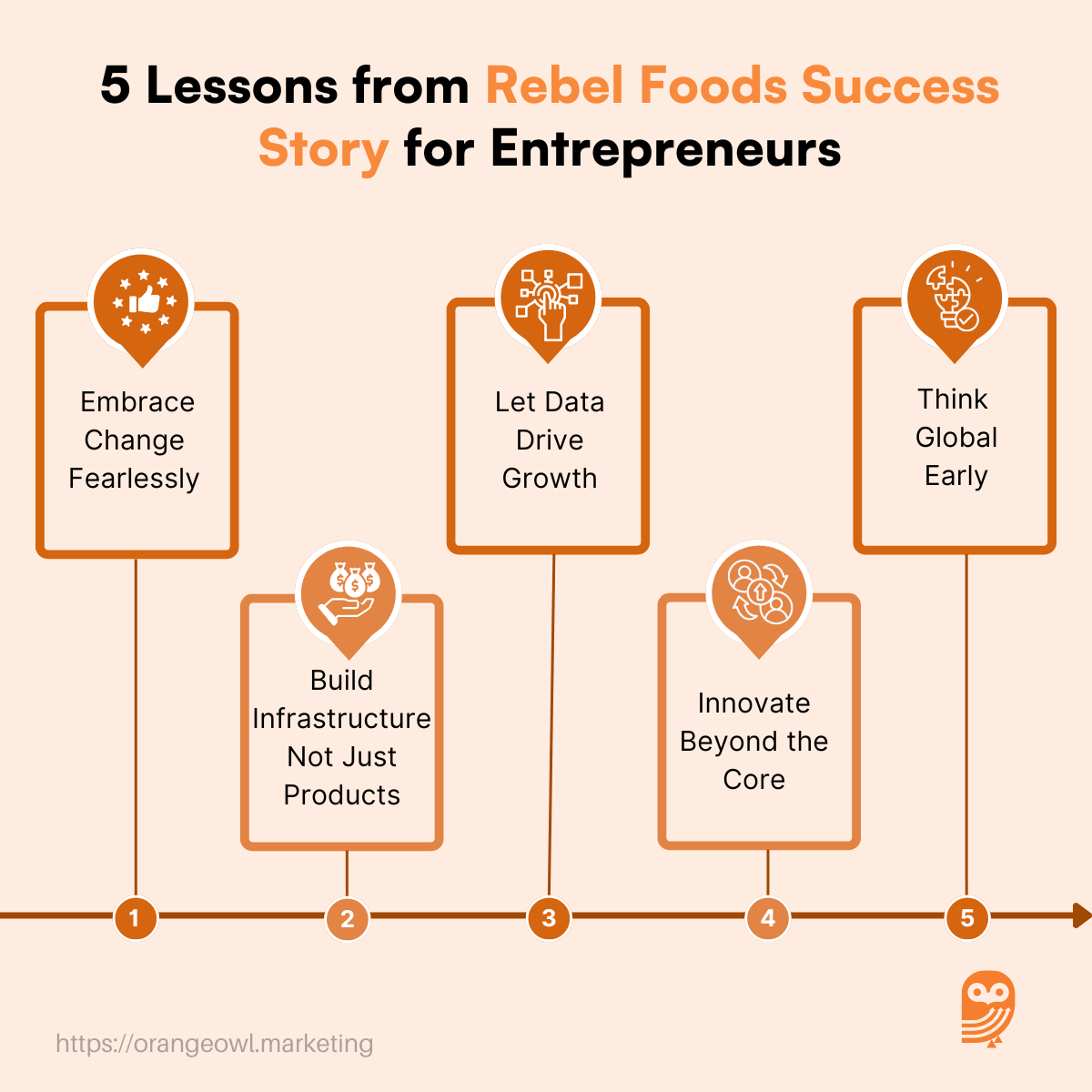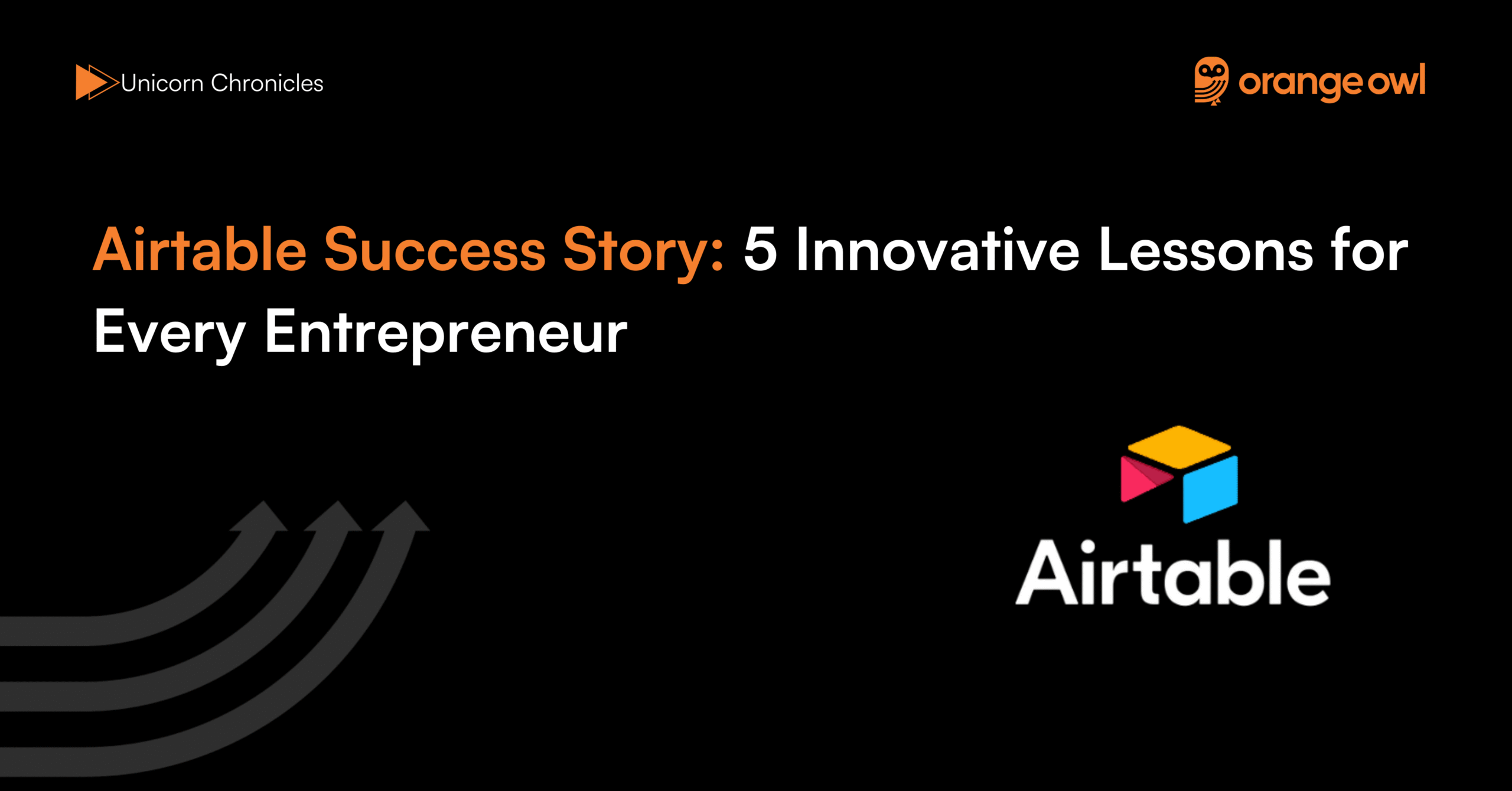Rebel Foods Success Story: 5 Essential Lessons for Every Entrepreneur
Vivek Goel
June 17, 2025

Table of Contents
Introduction
Rebel Foods, co-founded by Jaydeep Barman and Kallol Banerjee in 2011, has transformed from a single quick-service restaurant named Faasos into the world’s largest internet restaurant company. Operating over 450 cloud kitchens across more than 70 cities, Rebel Foods manages a portfolio of 45+ proprietary and partner brands, including Behrouz Biryani, Oven Story Pizza, Mandarin Oak, and The Good Bowl.
The company’s innovative approach to the food and beverage industry is driven by a clear vision, bold pivots, and a relentless focus on customer experience. By leveraging technology and data analytics, Rebel Foods has redefined how food is prepared, marketed, and delivered, staying ahead in India’s evolving food delivery ecosystem.
In 2021, Rebel Foods achieved unicorn status with a valuation of $1.4 billion. By December 2024, the company had raised over $770 million in funding, including a $210 million Series G round led by Temasek, with participation from existing investor Evolvence. This funding aims to expand its footprint and portfolio of brands.
Origin Story
Rebel Foods was founded in 2011 by Jaydeep Barman and Kallol Banerjee, both alumni of IIM Lucknow. The idea was born out of their personal struggle to find affordable, hygienic, and tasty food while living and working overseas. This pain point sparked the vision for a solution that could deliver high-quality meals without the traditional limitations of dine-in restaurants. They launched their first venture under the brand Faasos, a quick-service restaurant (QSR) specializing in wraps and Indian fast food, targeting urban professionals who wanted quick, dependable meals.
Initially, Faasos operated under a typical QSR model with physical storefronts across cities. While the brand gained early traction, it also faced operational challenges—rising rental costs, labor inefficiencies, and inconsistent customer experiences. Realizing that scaling a traditional restaurant chain would be capital-intensive and logistically complex, the founders made a bold pivot in 2015. They began shutting down high-cost storefronts and shifted entirely to a cloud kitchen model, also known as internet-first delivery-only kitchens. This strategic move would become the foundation for Rebel Foods’ future growth, enabling them to operate multiple food brands under one kitchen infrastructure, maximize asset utilization, and serve customers more efficiently.
The switch not only lowered overheads but also allowed the company to experiment with multiple cuisines, launch new brands faster, and collect valuable customer data to optimize operations—a key differentiator that propelled them toward becoming a global food-tech powerhouse.
Business Space and Early Challenges
When Rebel Foods began its journey in 2011, India’s food delivery ecosystem was still in its infancy. Consumer behavior had yet to shift significantly toward online food ordering, and the infrastructure for seamless delivery—riders, last-mile logistics, and app integrations—was fragmented and unreliable. Unlike the current digital-first landscape, early customers were skeptical about ordering food online due to concerns over hygiene, delivery times, and consistency in taste.
In this challenging environment, Rebel Foods faced the mammoth task of building a vertically integrated food-tech platform. They weren’t just preparing meals—they had to master the entire value chain: from managing raw materials and optimizing kitchen layouts to ensuring food safety and timely delivery. The stakes were even higher with cloud kitchens, as there was no physical storefront or dine-in experience to build trust. Additionally, the emergence of strong food aggregators like Swiggy (founded in 2014) and Zomato (founded in 2008, pivoting into delivery later) rapidly changed consumer expectations. To succeed, Rebel Foods had to innovate at every level—tech, brand, kitchen ops, and customer service—while operating in a market that was both cost-sensitive and logistically complex.
Growth Strategies
Rebel Foods’ rise from a single-brand restaurant to the world’s largest internet restaurant company is the result of several visionary and bold strategic initiatives:
- Cloud Kitchen Model: One of their most transformative decisions was embracing cloud kitchens early. This model allowed Rebel Foods to bypass the heavy costs of real estate and staff associated with traditional restaurants. With delivery-only outlets, the company could rapidly launch operations in new cities and regions while centralizing resources for better efficiency.
- Multi-Brand Architecture: Rather than sticking to a single food concept, Rebel Foods built an ecosystem of cuisine-specific brands under one umbrella. From Behrouz Biryani (premium biryani) and Faasos (rolls and wraps), to Oven Story (pizzas) and Mandarin Oak (pan-Asian cuisine), each brand addressed a different taste preference and customer persona. This enabled cross-brand synergy within the same kitchen infrastructure.
- Tech-Driven Operations: At the heart of Rebel Foods is its proprietary Rebel Operating System (OS)—a technology platform that manages inventory, staff workflows, real-time order tracking, demand forecasting, and customer feedback. This tech-first approach streamlined operations, reduced wastage, and ensured data-backed decision-making at scale.
- Global Expansion: Rebel Foods didn’t confine its ambitions to India. It expanded to UAE, Indonesia, Bangladesh, and the UK, both through owned operations and strategic partnerships. For instance, their collaboration with EatSure and cloud kitchen operators in the UK allowed for local brand adaptation while maintaining operational control.
Marketing Strategies
Marketing in a digital-only food business requires more than flashy ads—it demands brand intimacy, trust-building, and constant feedback loops. Rebel Foods understood this and revolutionized food marketing in a no-storefront world.
- Digital-Only Branding: Since Rebel Foods had no physical outlets or dine-in experiences, the brands had to be built from scratch on online platforms. Each sub-brand—whether it was Behrouz Biryani with its royal heritage or Oven Story with its modern, cheesy persona—was given its own identity, tone, and social media presence.
- Data-Driven Menu Innovation: One of Rebel’s secret weapons was its ability to read and react to customer preferences. They continuously analyzed order patterns, reviews, and ratings to iterate on menus, launch new brands, or retire underperforming items. For instance, regional preferences in spice levels or protein types directly influenced kitchen-level changes.
- Platform Partnerships: By closely collaborating with food aggregators like Swiggy, Zomato, and Uber Eats, Rebel Foods ensured better algorithm placement, shorter delivery times, and special promotional features. These partnerships increased visibility and often led to first-mover advantages during new product rollouts.
- Localized Campaigns: Understanding that food is deeply cultural, Rebel Foods tailored its campaigns by region. A campaign for biryani in Hyderabad looked different from one in Mumbai or Delhi, ensuring that every customer felt the brand “got” their local tastes and preferences.
5 Lessons Every Entrepreneur Should Learn from Rebel Foods
1. Embrace Change Fearlessly
One of the most powerful lessons from Rebel Foods is the courage to pivot when things don’t scale. Originally launched as a quick-service restaurant (QSR) chain under the brand Faasos, the founders Jaydeep Barman and Kallol Banerjee quickly realized that the economics of physical storefronts were not sustainable.
Rather than clinging to the original model, they took a bold leap into the uncharted territory of cloud kitchens—well before it became an industry trend. This agility helped them stay ahead of the curve and fundamentally altered their growth trajectory. For entrepreneurs, this is a reminder that being too attached to the first version of your business can hinder long-term success. Adaptability is often your biggest asset.
2. Build Infrastructure, Not Just Products
While most startups focus on refining their product, Rebel Foods built a strong backend infrastructure from the start. Their proprietary Rebel Operating System (OS) manages everything from inventory and workforce scheduling to customer feedback and demand forecasting.
This focus on systematizing operations allowed them to replicate success across locations and brands without compromising on quality. For entrepreneurs, this highlights the importance of scalable systems—because great products alone can’t win if your operations can’t keep up with demand.
3. Let Data Drive Growth
Data wasn’t just a support function for Rebel—it was central to brand creation, menu curation, pricing strategies, and marketing campaigns. By continuously monitoring customer preferences, ratings, reviews, and even delivery feedback, the company fine-tuned its offerings with precision.
This enabled them to sunset underperforming brands, double down on high-demand items, and even create entirely new cuisine-specific brands based on market gaps. For entrepreneurs, this shows how data isn’t just a numbers game—it’s a growth compass that guides smart, customer-focused decisions.

4. Innovate Beyond the Core
Rebel Foods didn’t stop at building its own brands. It expanded its cloud kitchen platform to become an enabler for third-party food entrepreneurs through its Rebel Launcher program. This initiative allows emerging food brands to plug into Rebel’s infrastructure—accessing kitchens, logistics, and technology—thus accelerating their market entry without high capital costs.
This strategic move turned Rebel from just a food company into a food-tech ecosystem. Entrepreneurs can learn from this: once your core is strong, explore adjacencies where your capabilities can add exponential value to others.
5. Think Global Early
Unlike many Indian startups that first master the domestic market before looking abroad, Rebel Foods integrated global scalability into its DNA from an early stage. Their tech stack, brand architecture, and kitchen operations were designed to be plug-and-play in any geography.
This forward-thinking approach made it easier for Rebel to expand into the UAE, Indonesia, Bangladesh, and the UK. The key takeaway? If your solution solves a universal problem, build it with global readiness in mind. The world is your playground if your foundation is robust and replicable.
Conclusion: Key Takeaways from Rebel Foods’ Journey
Rebel Foods is not just a food delivery company—it is a shining example of how deep innovation, technology-driven scalability, and relentless execution can transform even the most traditional industries. What began as a small wrap-selling QSR (Faasos) has evolved into a global powerhouse with over 450+ cloud kitchens operating 45+ brands across multiple countries, including India, UAE, UK, Indonesia, and Bangladesh. This evolution didn’t happen by chance; it was the result of a series of bold decisions—from shutting down physical storefronts to building a full-stack food-tech platform that powers both their own and third-party brands.
What sets Rebel Foods apart is its long-term strategic vision. The founders, Jaydeep Barman and Kallol Banerjee, chose to look beyond short-term profitability and focused on building infrastructure, technology, and data systems that could scale across markets and cuisines. Whether it was leveraging AI to optimize kitchen workflows or using customer insights to launch hyper-targeted brands like Behrouz Biryani and Oven Story, every move was rooted in delivering quality at scale.
Entrepreneurs across industries can draw powerful lessons from Rebel’s journey. Their ability to pivot when needed, invest in backend systems, and think globally from day one are traits that apply well beyond the food sector. Rebel Foods proves that the real magic happens when vision meets execution, and that in a fast-changing digital world, the companies that thrive are those that innovate across the value chain—not just at the consumer interface.
As the global food industry continues its shift toward digital-first experiences, Rebel Foods stands as a trailblazer showing how to lead that change—not just follow it.


